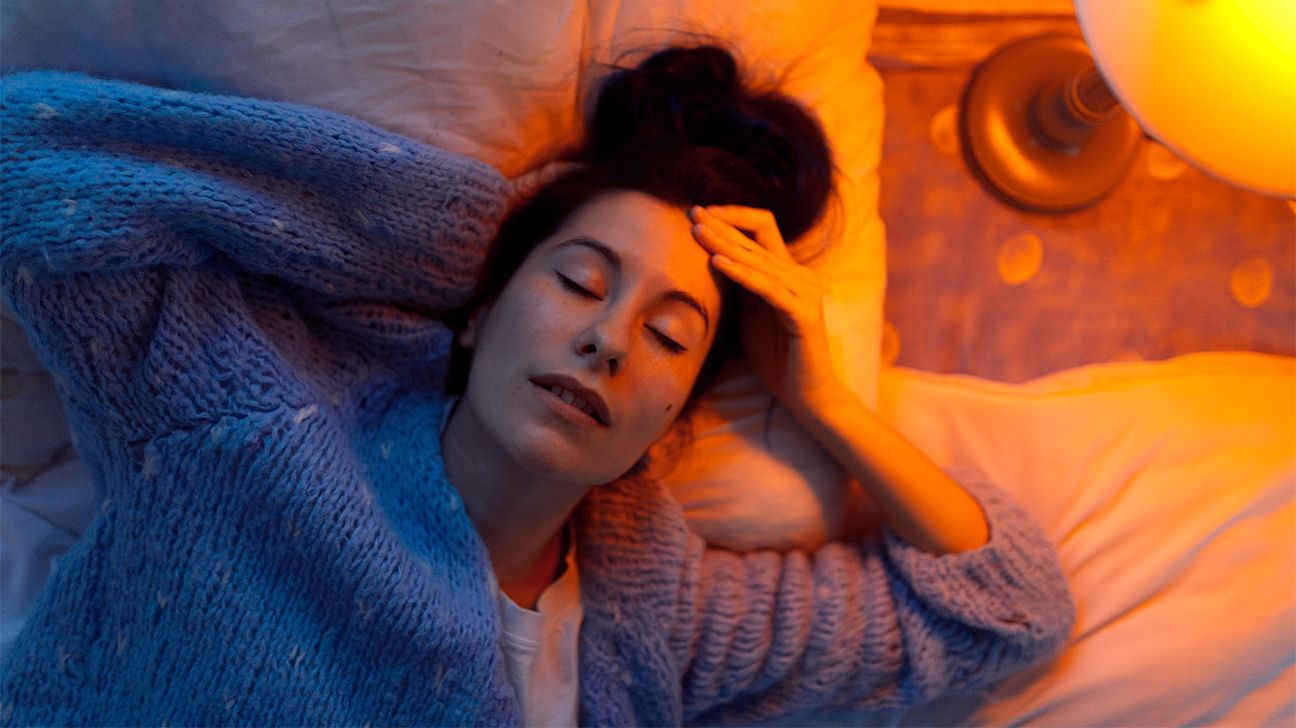It’s 1 a.m., and you’re lying awake, staring at the ceiling. It could be because of the annoying cramps and breast tenderness (no sleeping on your belly this week). But really, it’s the dang night sweats worthy of a summer night down on the Louisiana bayou. What the heck is going on here?
Night sweats are just what they sound like: nights where you experience excessive sweating. Most people think of them as something women might deal with during menopause. But hormonal fluctuations can cause night sweats during your period too.
Why do these episodes happen, and is there any way to make them suck less? Here’s what you should know.
Night sweats are pretty easy to recognize when you’re going through them. Basically, you get really, really sweaty while you sleep — to the point where your pajamas or sheets are straight-up soaked.
You might also:
- feel like your heart is racing
- have red or flushed skin
- feel weirdly chilly (yes, even though you’re sweating)
Why are period night sweats sometimes a thing? Basically, your hormones are to blame. In the days leading up to and during your period, your body experiences a rise in progestin and a drop in estrogen. That can cause a host of PMS symptoms, including night sweats.
Night sweats happen when blood vessels expand and quickly contract. This causes a rapid increase in blood flow, which can spike your temperature. Your body tries to cool off ASAP by turning on the waterworks — and then you wake up totally soaked.
The best way to cope with night sweats is to stop them from happening in the first place. That means taking preventive measures to stop your body from overheating.
Some smart strategies to try:
- Wear loose, lightweight pajamas (or nothing at all!). Clothes made of breathable materials like cotton are best.
- Layer a few lightweight blankets you can kick off one at a time if you get warm instead of one heavy comforter. Again, try to stick with breathable fabrics like cotton.
- Open the window or turn on a fan before bed. Pretty self-explanatory — but effective nonetheless!
- Steer clear of potential triggers in the evening. Alcohol, spicy foods, caffeine, and cigarettes can all make night sweats more likely.
- Tuck a cold pack under your pillow. When you wake up feeling warm, you can flip your pillow to the cool side.
- Reschedule nighttime workouts. Exercising before bed can ramp up your body temp and make you more prone to sweating, so consider working out at a different time of day.
- Find ways to de-stress. Unchecked tension and anxiety can cause you to sweat more overall.
Also worth keeping in mind: Take steps to maintain a moderate weight. Research has shown that losing weight may help reduce hot flashes in menopausal women who have higher body weights.
While there haven’t been studies showing whether weight loss could have the same effect on PMS-related night sweats, research has shown that women with higher BMIs may be more likely to experience PMS symptoms.
Certain medications — including some steroids, SSRI antidepressants, and some blood sugar lowering drugs — can also cause night sweating. If you take any of these types of meds and you have night sweats, talk with your doctor about possible solutions.
Night sweats could be a sign that you’re going through early menopause. But it’s pretty unlikely unless you’re dealing with other menopause-like symptoms too.
Those might include:
- hot flashes
- vaginal dryness, itching, or irritation, especially during sex
- unusual mood changes
- insomnia
- short-term memory problems or trouble concentrating
Night sweats in younger women could also be a symptom of primary ovarian insufficiency (POI), a condition in which your ovaries stop working normally before age 40. (That’s different from early menopause, which is when your periods stop completely before age 40.)
The first sign of POI is usually irregular or missed periods. Night sweats tend to come on afterward, along with other menopause-like symptoms.
Last but not least, persistent night sweats could be a sign of another health condition, such as:
- thyroid imbalances
- side effect of medication
- auto-immune disorders
- anxiety
- infection
If you’re not convinced your period is to blame, call your doctor. Which brings us to…
A sweaty night or two before your period can be annoying but probably isn’t cause for concern. But if you seem to get night sweats a lot or you feel like they’re interfering with your life, it’s worth looping in your OB/GYN.
The same goes for if you’re dealing with any other symptoms that could be signs of POI, early menopause, or other potential health issues.
Here are a few to keep an eye out for:
- irregular periods
- hot flashes
- trouble concentrating
- pain during sex
- less interest in sex
- difficulty getting pregnant
- unexpected weight loss
Night sweats during your period may be annoying, but unless they’re happening all the time, they’re probably nothing to worry about.
Add some sweat-fighting measures to your period survival kit (ibuprofen✓ ginger tea✓ ice water✓ breathable jammies✓ a stack of rom-coms for couch time✓) and you’ll reduce those sweaty, sleepless nights in no time.

